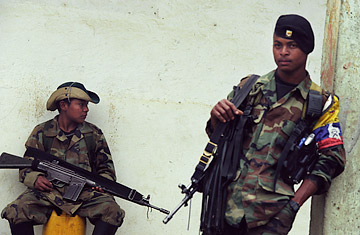
Rebel soldiers from the Revolutionary Armed Forces of Colombia, or FARC, in Tacueyo, Colombia
(2 of 2)
There was no question that the money was the evil lucre of rebel drug deals, extortion rackets, and ransom payments made by the desperate relatives of hostages. By some estimates, such scams earned the Revolutionary Armed Forces of Colombia — the country's largest guerrilla army known as the FARC — $500 million annually. But knowing that these riches were tainted didn't stop Suárez. "I was so happy. I'd never seen so much money," he said. "It was like the Virgin had appeared before me."
As word of the fantastic riches spread, more and more troops began scouring the jungle floor, hacking at the earth like overcaffeinated grave diggers. The blue barrels bulged with Colombian pesos but they also found yellow containers filled with U.S. currency. How much was there? Months later, a report by the office of Colombia's inspector general estimated that the containers held $14 million in U.S. and Colombian currency. But in the same report, several troops testified that the final haul exceeded $43 million. One government investigator said the figure was much higher — more than $80 million.
Lt. Jorge Sanabria, one of the two commanding officers, never seriously contemplated doing the right thing. His troops were so poor that none of them even qualified to pay income taxes. Besides, Sanabria figured that if they turned in the money, higher-ranking officers would give his soldiers three-day passes, then start filling their own pockets. Wasn't that what always happened? It was like that scene in the Clint Eastwood flick Kelly's Heroes, where the preppy American captain warns Big Joe and his exhausted foot soldiers that the punishment for looting is death even as he considers the logistics of loading a German yacht aboard a B-17.
What's more, the rebel stash had already been stolen by gun-toting bandits performing cashectomies on the good people of Colombia. Rather than committing a crime, Sanabria reasoned, his men were performing a public good. They were cheating the cheaters out of money that would otherwise go toward grenades and guns, making the guerrillas stronger. Rather than being castigated, they ought to be decorated. There was also a sense among the troops that the cash was a serendipitous payoff for years of dangerous duty protecting the homeland. And if that wasn't enough, it was Easter week, the holiest time of year in Colombia. Many soldiers viewed the treasure as nothing less than a gift from God.
Soon, however, the troops began to feel like they were trapped inside a gold mine with no way to extract the bullion. Their stacks of dollars and pesos added up to nothing because there was nothing to buy: no bars, no brothels, no BMW dealerships. "Imagine having so much money and nothing to eat!" said one of the Colombian GIs, Frankistey Giraldo, whose father named him after Frankenstein. When they looked at themselves, they still saw a bunch of hungry, unwashed peasants in the middle of no-man's land. They were fabulously wealthy. Except they weren't.
Yet even in a place where consumer spending never before existed, the rules of the market economy suddenly kicked in. And the explosive growth in the money supply, combined with pent-up demand, led to another economic phenomenon: hyperinflation. Cigarettes sold for as much as one million pesos a pack. A roll of toilet paper cost 100,000 pesos, or $34. Suárez recalled a bidding war that broke out over a transistor radio that finally sold for the equivalent of $12,000. Some of the troops, intent on spending every waking hour looking for money, bought their way out of KP by paying colleagues up to 10 million pesos — or about $3,500 — to replace them.
The treasure hunt lasted three glorious, sleepless, elongated, excruciating days and nights. Then word crackled over the radio that fresh troops were moving in to replace nouveau-riche grunts. It wasn't exactly mission accomplished. But the soldiers felt giddy all the same. They had penetrated into a rebel rearguard position, outwitted the enemy, and kept themselves alive. Then there was the money. Sure, they had struck out in their search for Keith, Marc and Tom. But referring to the twenty-, fifty-, and hundred-dollar bills they'd dug up, Suárez pointed out they had already found three gringos: Andrew Jackson, Ulysses S. Grant, and Benjamin Franklin.
(Another excerpt from John Otis' Law of the Jungle can be found here.)
From Law of the Jungle: The Hunt for Colombian Guerrillas, American Hostages and Buried Treasure. Copyright © 2010 by John Otis. Published by William Morrow.
